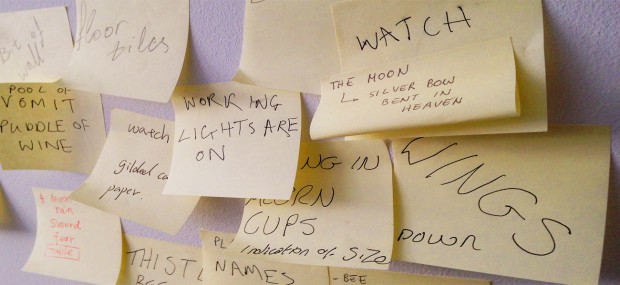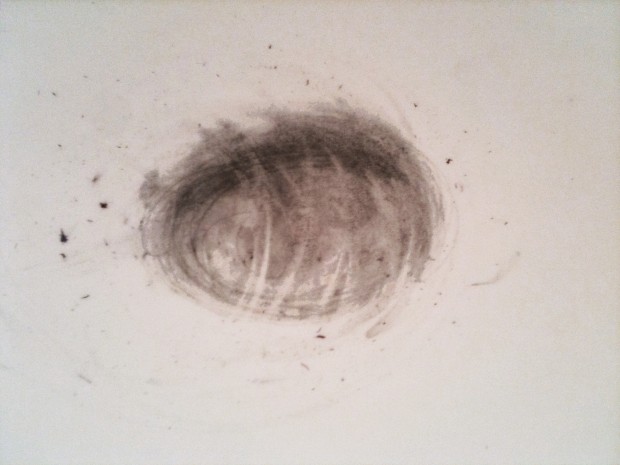REFLECTIONS 1: Eggs is eggs
I have led university courses for nearly two decades – I think I do what I expect of myself pretty well, but always know I can do it much better.
I teach in what is a very well established Theatre Department; it has a history stretching back sixty years, so I inherited many good things but also many weaknesses that the students and I identify and try to improve upon, year-on-year. My teaching philosophies and methdologies that continue to evolve have been founded on, to a large extent, mirroring what goes on in the entertainment industry and either slowing and stretching processes or creating ideal circumstances in which to make work; professional exemplars.
I some times wonder, although I still have an increasingly busy design practice in the theatre world, whether some of the decisions I’ve made in reshaping the course are an attempt to build a professional utopia – the circumstances that I would love to work in but have never found (and are unlikely to find) – am I chasing shadows?
Practice in teaching and a teaching practice
I think I know my specialism in the industry well but I know I require more, just beyond my grasp, to support an undergraduate or postgraduate’s way of thinking, as much as the mechanics of making. For example, further enquiries into the processes of ‘thinking-through-doing’ would probably benefit my teaching (particularly of those students with dyslexic tendencies) and perhaps also help me articulate how my own design practice connects to the norms of research. I know the two are linked in a complex way and that, with perhaps another ten years of teaching ahead of me, there’s time to be that reflected practitioner I think I am, but know I doubt.
The process of rehearsal in the creation of a theatre event is a potent blueprint for research-in-action through collaborative effort, but I have a strong hunch that there are more carefully considered ways of testing ideas using group dynamics that might help me to support the rapidly growing numbers of students and their increasingly sophisticated attitudes. I need to be armed for what we anticipate to be, an increasingly demanding learning environment.
The theatrical rehearsal simile will become increasingly inadequate as undergraduate cohort numbers (say 30 plus) exceed the sizes that conveniently mirror theatre companies and other, more sophisticated or flexible strategies, have to be employed. For instance, identifying when instruction of tested processes can be delivered in a didactic, classical chalk ‘n talk teaching environment is far more appropriate than a more discursive tutor-to-student relationship. Furthermore, that there are ways of dissemination that are direct but retain elements of a dynamic engagement with students and their subject rather than mere ‘route one’ delivery.
My knowledge-base of educational practice started as an undergraduate myself over twenty five years ago. I made some inroads into discovering how various forms of ‘open’ education worked, from the experiments of an increasingly inclusive and socially aware Britain of the late 1920’s and 30’s to schools such as Summerhill and the ideas of John Holt or Ivan Illich. There is increasingly lees time to research and apply radical pedagogic ideas within the strictures of Higher Education nowadays. The processes, no, culture of change, leaves to intellectual space to test, reflect, and test without the context having shifted and rendering those ideas without anchor points. There is certainly no room for freewheeling, serendipity and alchemy. Art schools were a safe zone to discover your place in the world through a personal command of your experience rather than the acquisition of tokens – the environment was everything. Students took that ethos, rather than a knowledge-base into the workplace. Value was carried within, rather than substantiated by what they produce. Universities are for enrichment. Free-range eggs may taste no different to ‘barn’ eggs, but the chickens certainly have a better time of it.
Fulfilling a role but retaining an attitude
It has been, and still is, hard to come to terms with the notion of assessment. Nobody likes a harsh review and those that do are, more often than not, considered to have some sort of perverse deeply-rooted psychological need to be disciplined. As artists and designers, critiques of work are often a hush-hush, behind-your-back affair as a knee-jerk peer group reaction squandered over a glass of wine at a first night party or the territory of a journalist’s clique. For me, there is distaste and a certain vulgarity attached to subjective value-judgement, however tempting it may be to dish it out; partisanship being corporate (a strange collective ego) as much as individualistic.
I’ve tried different ways of engaging students with the assessment process so that they both understand how it’s carried through, but also appreciate it’s merits as a formative experience. For instance; students grading themselves and analysing their conclusions or grading a fellow students’ analysis of another piece of student work. Employing these strategies are exceptions rather than becoming embedded in the culture of the course as there is so little chance, in a time of continuous and rapid changes to curricula mostly imposed from beyond the concerns of the subject, to evaluate their worth, make refinements and allow them to take root.
Throughout teaching and witnessing learning, a continuous challenge for me is how to truly objectify the application of assessment criteria and make fresh approaches to student feedback that support a student’s growth and self-esteem.
Theoretical and practical elements on courses are delivered by discreet staff teams although all staff are theatre-centred. The students make their own connections between the two and a chemical reaction hopefully takes place. There are pressures for practice-based staff to deliver theoretical elements and I believe that economical expediency will fuel an increasing need for this trend to grow. In my own design practice, I tend to read around a particular subject (opera, play text or whatever) but rarely make the opportunity to broaden my scope and go off-piste. The perennial problem remains; when to reach out and when to pull in?
The question is: How can I advise appropriately students when I know my own research techniques have a glass ceiling?
What I can’t afford to do
Despite seismic shifts in structure, much of the University of the Arts London’s teaching is still delivered by seasoned practitioners for future and current practitioners. I like that. So much of recent history in bureaucratic university life has been dominated by systemic contortions; attempting to squeeze what one knows instinctively to be of value into alien models that do little to improve the actual quality of the student experience on the ‘shop floor’.
These time-consuming feats of acrobatics are, more often than not, a diversion from our central purpose; to support the emergent artists and designers of tomorrow through accumulative cycles of dialogue, reflection and production. As educational professionals we now have to be on our guard or the lookout for:
- Not being fully up to speed with the thrust of central government aims (if there are any) and thereafter the strategies of various agencies to achieve them.
- More ‘tricks’ in writing course outlines to both fulfill generic requirements whilst maintaining the flavour of a specific subject.
- How students can capture feedback in an on-going organic fashion rather than focusing upon summative assessment points.
- How motivation and achievement is affected by assessment therefore, and a growing culture of ‘bean counting’.
After thought
I aim to come to better terms with synchronising these and other elements so that it is not such a struggle for me on both a day-to-day basis and at critical moments in the professional academic cycle (such as a course revalidation). Moreover, so that the students have a clearer understanding of the philosophical purpose of study as a keystone activity in the cultural life of not only this country, but the world at large.


